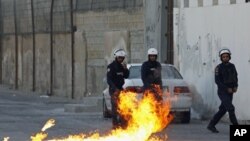Clashes between security forces and anti-government protesters in Bahrain have intensified as the first anniversary of the country’s uprising draws closer, signaling that limited efforts toward national reconciliation are failing.
Some opposition supporters are vowing to mark the February 14 anniversary by marching back to the original site of their protest movement - the symbolic Pearl Roundabout in the capital Manama that has since been turned into a restricted military zone.
Riot police used tear gas to stop demonstrators from reaching the site over the weekend.
Violence in areas outside the capital has increased substantially in recent weeks, with a growing number of activists throwing stones and fire bombs at security officers and burning tires to block roads.
The government and the main opposition al-Wefaq party have condemned the violence, but radical figures from both sides of the conflict appear to be inciting further attacks.
Shi'ites make up nearly two-thirds of the local population and say they are marginalized by the ruling Sunni minority.
According to Abdul-Aziz bin Mubarak Al-Khalifa, an international media adviser at Bahrain’s Information Affairs Authority, the prolonged unrest is deepening divisions between the two communities.
"We have seen an emergence of a political Sunni coalition, who have also become now very vocal, so now we’re actually dealing with two camps that are quite polarized," said Khalifa.
A Manama resident, who would speak only on condition of anonymity, described how many Sunnis have come to regard their Shi’ite compatriots.
"We don’t want to live with them anymore. We don’t want to sit with them. We don’t want to work with them."
Some analysts blame slow political reform for the growing sectarian rift.
The Bahrain Independent Commission of Inquiry issued a report in November that provided the government with a number of recommendations to help kick-start a national reconciliation process.
However, Kristian Coates-Ulrichsen, a research fellow at the London School of Economics, said the government’s failure to implement the suggestions resulted in a wasted opportunity to regain some middle ground in the increasingly polarized conflict.
"The danger now in Bahrain is that it will become, more or less, a frozen conflict, as all sides will basically withdraw to their own hard-line positions," said Coates-Ulrichsen. "So I think the prognosis, at least in the short term, is quite gloomy because the government continues to show little interest in any meaningful reform."
Speaking in Manama last week, U.S. Assistant Secretary of State for Democracy, Human Rights and Labor Michael Posner underscored America’s strong relationship with Bahrain.
The U.S. Navy’s Fifth Fleet is based in the kingdom and is seen as vital to counterweight Iranian influence in the oil-rich Persian Gulf.
During his speech, Posner encouraged all sides in Bahrain to show respect to one another in the run-up to February 14.
"We call on all Bahraini citizens to refrain from violence. We also urge the government to permit peaceful demonstrations and the right of all citizens to express their political views," said Posner.
Rights groups say more than 60 people were killed in the past year as a result of the government’s crackdown on the opposition.
Bahrain More Divided One Year After Unrest




